Last updated: December 23, 2023
Place
Republic Cafe

Photograph by Elmer A. Dolera, courtesy of the California State Historic Preservation Office
Quick Facts
Location:
37 Soledad St., Salinas, California
Significance:
Ethnic Heritage - Asian
Designation:
Listed in the National Register - Reference number 11000430
OPEN TO PUBLIC:
No
MANAGED BY:
Private
Republic Cafe in Salinas, California was listed in the National Register of Historic Places in 2011. The property is significant as a long-time gathering place in Salinas's Chinatown for the area's Chinese, Japanese, and Filipino communities.
Chinese workers began immigrating and settling in the Salinas area beginning in the 1860s. As the number of Chinese workers grew, the town's newly-erected Chinatown provided much-needed services to the largely male, single, Chinese-born residents. Beginning in 1910, the Chinatown's demographics began to shift with an influx of Japanese farm laborers; from that point on, the Chinatown's Chinese population was largely of the merchant class due to restrictions of immigration for Chinese farm laborers, while the rest of the population was composed of farm workers of other ethnic backgrounds, including Japanese, Filipino, and Mexican laborers.
The merchant class strengthened their standing in Chinatown in the 1920s by constructing buildings to meet the needs of the increasingly non-Chinese labor class, while also building spaces for Chinese culture. During that decade, the future owners of the Republic Cafe, the Ahyte family, moved to the Salinas area. Wallace Ahyte, the patriarch of the family, became involved in the hotel, gambling, and restaurant business.
In 1941, Ahyte and his business partner, Bow Chin, built the Republic Cafe. It became the area's largest Chinese restaurant, hosting Lunar New Year celebrations, birthdays, weddings, after-funeral gatherings, banquets, and luncheons. With the ability to host 150 people in its dining room, the Republic Cafe became a beloved gathering space for the area's Chinese, Japanese, Filipino, Mexican, and African American communities.
Starting in 1957, Salinas's Chinatown faced an economic downturn. Under the Federal Urban Renewal Program, many of the area's wooden structures were deemed unsafe, and were torn down. Most Chinese residents left the Chinatown, including Wallace Ahtye's son, Wally. Wallace and his wife remained in their residence above the restaurant, operating it until Ms. Ahyte's death in 1988. The building remains vacant, and caught fire in 2022. However, there are plans to transform the building into a cultural center and museum commemorating Salinas's Chinatown.
Chinese workers began immigrating and settling in the Salinas area beginning in the 1860s. As the number of Chinese workers grew, the town's newly-erected Chinatown provided much-needed services to the largely male, single, Chinese-born residents. Beginning in 1910, the Chinatown's demographics began to shift with an influx of Japanese farm laborers; from that point on, the Chinatown's Chinese population was largely of the merchant class due to restrictions of immigration for Chinese farm laborers, while the rest of the population was composed of farm workers of other ethnic backgrounds, including Japanese, Filipino, and Mexican laborers.
The merchant class strengthened their standing in Chinatown in the 1920s by constructing buildings to meet the needs of the increasingly non-Chinese labor class, while also building spaces for Chinese culture. During that decade, the future owners of the Republic Cafe, the Ahyte family, moved to the Salinas area. Wallace Ahyte, the patriarch of the family, became involved in the hotel, gambling, and restaurant business.
In 1941, Ahyte and his business partner, Bow Chin, built the Republic Cafe. It became the area's largest Chinese restaurant, hosting Lunar New Year celebrations, birthdays, weddings, after-funeral gatherings, banquets, and luncheons. With the ability to host 150 people in its dining room, the Republic Cafe became a beloved gathering space for the area's Chinese, Japanese, Filipino, Mexican, and African American communities.
Starting in 1957, Salinas's Chinatown faced an economic downturn. Under the Federal Urban Renewal Program, many of the area's wooden structures were deemed unsafe, and were torn down. Most Chinese residents left the Chinatown, including Wallace Ahtye's son, Wally. Wallace and his wife remained in their residence above the restaurant, operating it until Ms. Ahyte's death in 1988. The building remains vacant, and caught fire in 2022. However, there are plans to transform the building into a cultural center and museum commemorating Salinas's Chinatown.
